 |
| Pete and mother Eleanora |
 His maternal grandparents were Joseph S. Wesley and Ida Belle Lynch. Joseph was a licensed huckster by trade, selling fish and flowers, and Ida was a housewife. Joseph Wesley was born in Port Perry, PA, and his Father was from Bohemia. Dad’s paternal grandparents, William Isaac Fleming, and Margaret Irvine died when he was five or six. His grandfather came to the United States from Ireland.
His maternal grandparents were Joseph S. Wesley and Ida Belle Lynch. Joseph was a licensed huckster by trade, selling fish and flowers, and Ida was a housewife. Joseph Wesley was born in Port Perry, PA, and his Father was from Bohemia. Dad’s paternal grandparents, William Isaac Fleming, and Margaret Irvine died when he was five or six. His grandfather came to the United States from Ireland. My Dad was educated in Pittsburgh public schools and never attended college. After graduating from Westinghouse High School in Pittsburgh, my Father said his future looked grim. He had several options but needed help to see himself as a steelworker, a fireman, or a mechanic. Joining the Army was what he decided to do. It may have been the worst idea he ever had or the best idea. But, at that time, he saw it as his only option. He took advantage of several correspondence classes in math and sales.
During our summer vacations, the thick black smoke from the steel mills was a sight when we went into Pittsburgh after a two-day drive from Florida. In the late fifties, pollution and black smoke billowing from smokestacks was not a problem I worried about. I don’t believe that my Father ever regretted leaving Pittsburgh.
This story is about what kind of man my Father was and how he dealt with his experience in WWII after 50 years of silence. As a child, I knew of certain aspects of my Father’s time in the Army. As a small child, I knew my Dad was in the Army and stationed in Hawaii, and I knew he enlisted against his Mother’s wishes. I knew who Hitler was, and I played with dirt making bombs and yelling, “Bombs over Tokyo.
A tall, blue-eyed blonde, he was a Staff Sergeant in the 64th Coast Artillery while stationed at Fort Shafter in Honolulu, Hawaii.
He served in the Army for six and a half years. He loved the beaches nearby and paid the inevitable price for loving the sun. He constantly battled skin cancer in his older years, having had no sunscreen available most of his life.
On December 7th, 1941, my Dad was eating breakfast in the Army mess hall when the bombing of Pearl Harbor began. As would have been my words, he yelled, “Holy Shit.” He was sent to his battle station and watched the event unfold from the mountains. My Father was due to go home on leave on December 8th but had to stay because of the bombing. What followed was a journey on the RMS Mauritania, an ocean liner converted into a troopship headed for Germany. Docked in New York, it left the United States arriving in London. The details of how my Father got from London to Germany are unknown, but I suspect it was by rail. He was captured near the war’s end and held as a prisoner by the German Army for about thirteen days. I know that he was freezing, hungry and miserable. The few things he returned home with were a German Nazi armband and a set of German Army eating utensils. He spent time traveling in a boxcar that was shot at by US Forces. That is all he ever mentioned about Germany.
My parents were married in Pittsburgh in April of 1943. WWII ended in 1945.
When he was released after WWII ended, he returned to Pittsburgh. One evening, while sitting with my Mother and grandmother on the stoop of my grandmother’s house on Upland Street, two Army officials arrived to advise my Mother that her husband was missing. His response was, “No, I’m not. I’m right here!”
Dad kept his photo album from his Army days in Hawaii in my closet. I would sit on my bed at night, looking through the album. Most of the photos had nothing written on them. While looking through the photo album, I often asked him about the Hula Dancers, the men, and the artillery in the photos. His answers were usually the same, “That was someone I knew in the Army” or “You don’t want to know about that.” I didn’t know who any of the men in the Army pictures were. Francis Bresch was the exception. Through the years of summer vacations in Pittsburgh, my Father was always sure to have a long phone visit with Fran. After all, they grew up together and experienced the attack on Pearl Harbor together. Dad kept up with Fran until
Fran died in the 1960s.
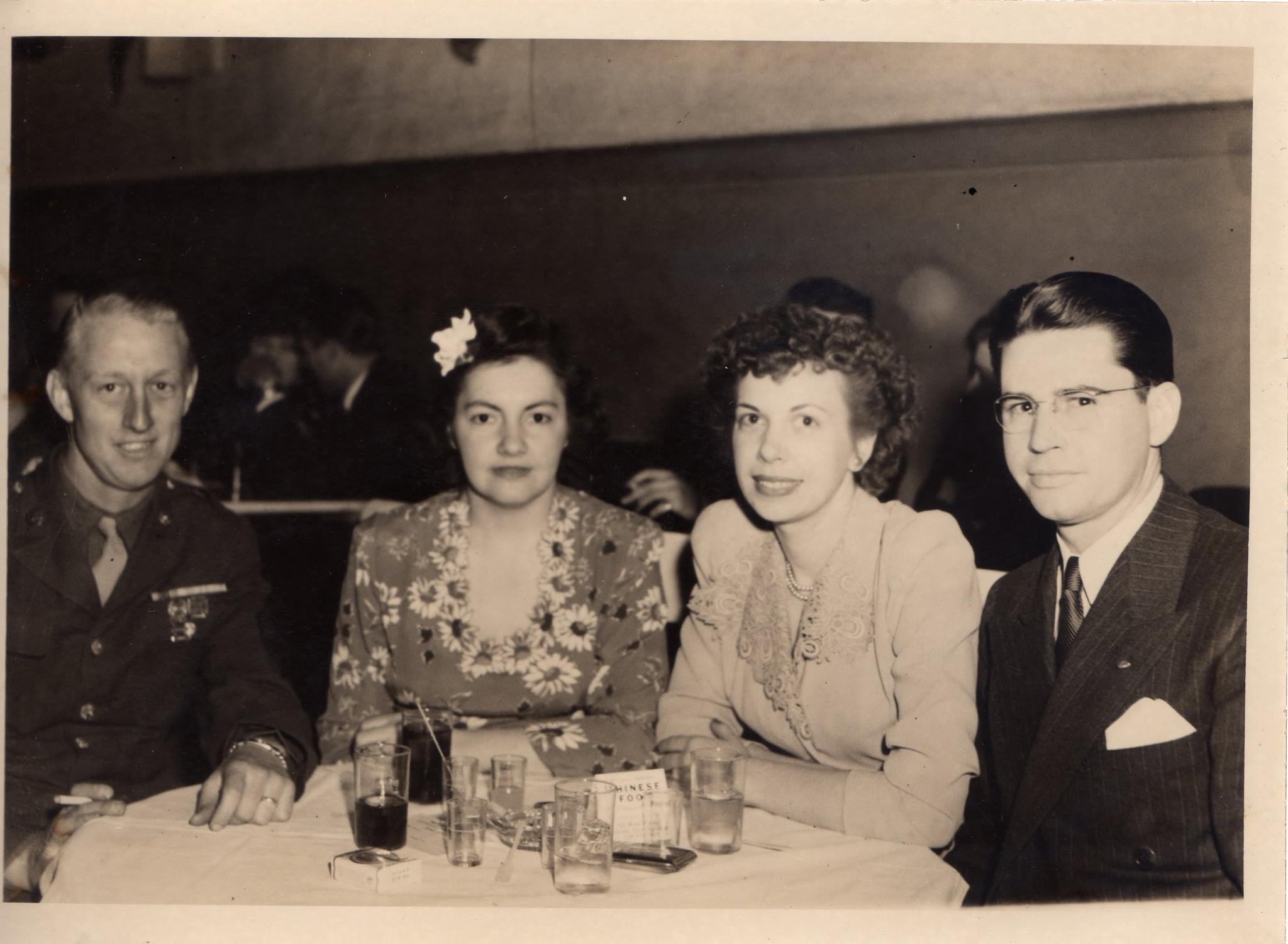
Pete and Dorothy and Fran and Dorothy Brecsh in the 1940s
Mom and Dad lived in El Paso, TX, where Dad was stationed at Ft. Bliss and briefly returned to Pittsburgh after his Army discharge. My Mother’s Uncle George White was friends with the owner of Crowley’s Dairy, and Dad was hired by Crowley’s in Miami. He was promoted and moved to Crowley’s plant in Jacksonville. However, Crowley’s closed, and Dad went to work for Sealtest, returning to Miami. He returned to Sealtest in Jacksonville within the year, where he remained for the rest of his career. Dad made a life for himself working for Sealtest as a Sales Supervisor for over thirty years. He mainly traveled around northern Florida and southern Georgia, calling on grocery stores and restaurants selling accounts to carry Sealtest ice cream and milk products.
My Father talked to me about his experiences on the 50th Anniversary of the attack on Pearl Harbor, and he realized he was a part of history. Dad also began to write. My Mother would later tell me Dad typed and cried for hours. My Father knew how to use a typewriter, but without correction fluid, he would start his writing repeatedly. He always thought that he wanted to return to Germany as a tourist, but he never traveled out of the country again.
I am fortunate to have his letter to the newspaper and letters he wrote to Army friends he had reconnected with. Unfortunately, I have trouble getting through them without crying. I’m a lot like my Dad in that way. Unbeknownst to me, my Father’s war and combat experiences haunted him his entire life. In one of his letters, he noted that he was “pretty messed up” after the war. Few would have ever known.
Dad was a man of few words. My Father had high morals and expected others to have them. I can say that I never heard him raise his voice to my Mother or me and never saw him lose his temper. When angry, he became quiet and didn’t have much to say. I am sure that he suffered from depression throughout his life, but he never sought help. He liked to drink, but I never saw him have more than one drink at a time, and I never saw him drunk or drink during the day or after dinner. It was a rare occasion that I heard him swear, as he did not use foul language. He never touched another firearm after the war. He battled the ravages of smoking and weekly sunburns, probably thinking it was all worth it. He rarely expressed any regrets. He always gave his paycheck to my Mother, who handled their financial affairs using her extensive bookkeeping skills.
My Dad regularly brought ice cream to my school parties in elementary school. I can still see him entering my classroom with a big box of small ice cream cups with little wooden spoons. I was always fascinated with the dry ice he packed with the ice cream, and I was not too fond of those little wooden spoons.
In his spare time, he was a Boy Scout Leader. My brother was a member of the troop, and Dad was also involved in adult training for the North Florida Boy Scout Council.
Music was a big part of my Father’s life. He had a Garrard turntable and trendy HI-FI components he put together himself. My Father loved good music and introduced me to the great vocalists, jazz musicians, and band leaders of his time. He listened to Billy Strayhorn and Ahmad Jamal, who graduated from the same high school in Pittsburgh as my Dad. My Father loved Ella Fitzgerald, Duke Ellington, George Shearing, Sarah Vaughn, and Keely Smith. He discovered Diana Krall before I did, and I remember him telling me, “Hey, you’ve got to listen to Diana Krall. She is something else!” He was right. I wish I could have taken him to see her in concert when she came to Jacksonville.
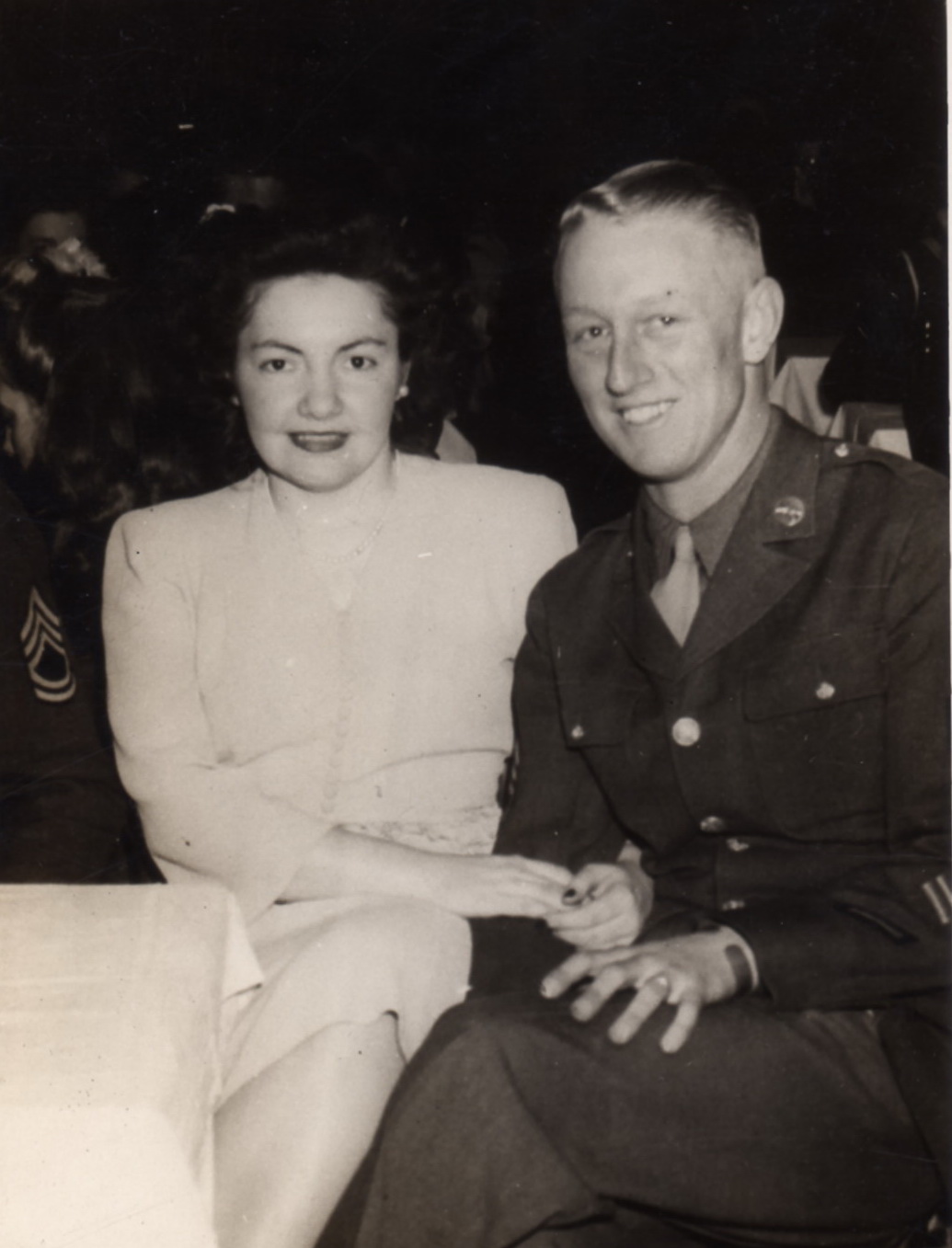
Dorothy and Pete
Dad bought me my first 45 record. It was a 45 with four hits sung by Johnny Mathis. He also bought me a 45 by the Everly Brothers. Dad hated the Beatles and rarely let me listen to “my station” on the car radio. I gave up asking on the 7:00 AM ride he gave me to junior high. Dad always had his car radio tuned to Jones College Radio, and I don’t recall ever having the nerve to change the station. He despised John Lennon and especially Yoko Ono. I was so upset after John Lennon’s murder that I went over to my parent’s house to tell them. My Dad didn’t get it at all. Sometimes, my Dad would comment, “I like that song.” He didn’t realize he was listening to a Beatles song by Andy Williams and loved the Beatles’ orchestral renditions by the Hollyridge Strings. He owned a short-wave radio that fit into the desk he made for me to do my homework when I started school. The desk had a large workspace, a linoleum work surface, and wrought iron legs. It was painted turquoise blue. Sometimes he would come into my room at night, and we would sit on the floor listening to the short-wave radio. I remember turning the dial round and round in small increments. He would recognize the different languages we heard and tell me what countries we were listening to.
Dad loved grilling steaks on Sunday, roasting oysters, and golfing. We even played golf together after my futile attemp to learn the gane,. After retiring from Sealtest in the early 1980s, Dad devoted him time woodcarving. He built a shop in his back yard to house his tool and equipment and spent most of his time woodworking. Many challenging jobs came his way restoring broken antiques that were damaged. He was featured twice on local television channels featuring his woodcarving and interviews about his volunteer classes for seniors. He was excellent at getting publicity for the woodcarving guild he and his friend Carl Zart started. He carved missing garlands on some high-end furniture, a lost Chinese dog from a headboard post, and Lion’s snout that had broken off of an old mantle. He also carved a mace carried during graduation ceremonies every year at Edward Waters College. The details on these pieces he replaced could only be hand carved. He was always ready to repair my broken antique chairs and anything I had that needed fixing. He carved dogwood on the huge rough, ugly piece of wood the builder supplied for the mantle for my house on Cinderbed Drive in 1984. He inspired me to turn my quilting hobby into the business of sewing custom jobs, quilt repairs, and tee-shirt quilts. I made a little money and met some wonderful people making quilts for others. I loved the many challenges of doing custom work. I believe that his main goal was pleasing others. I am sure he loved getting paid handsomely too.

“Pete” Fleming, United States Army
My Father seemed at peace with his place in history at the end of his life. However, after losing my Mother, he was lost in managing money and caring for himself. I reminded him that if he made it through Pearl Harbor, WWII, Germany, and being a POW (not to mention putting up with raising my brother and me), he could make it through Mother’s death. He responded, “Well, I guess so if you look at it that way.” Our trip to the local funeral home after Mother’s death was an eye-opener for me when my Father didn’t know how he would pay the funeral director. I explained to him that Mom had life insurance and that he had plenty of money. I suggested we use Master Card for what he owed, and he replied, “Okay, then that’s what we’ll do.” I told him, “Don’t worry, Dad, I will make sure everything goes smoothly.” And it did. After things settled down and my Father faced handling his finances and paying bills, I made a spreadsheet showing his net worth and what he would need to pay his monthly bills. What my Mother had built for them financially was worthy of respect and amazement on my Father’s part. After explaining my spreadsheet in detail and reassuring him I would be there to help him, he thanked me and said, “Where did you learn all of this?” I couldn’t even speak.
Growing up, my Father was on the road traveling for Sealtest during the week. He was always home on the weekends. I never knew him to leave the house alone at night or “out with the boys” in the evening. He had several friends with whom he played golf, and many golf outings were with customers. He was a Mason but never attended meetings. We went to church regularly, but Dad never mentioned Jesus or made bible references. He never spoke to me about religion.
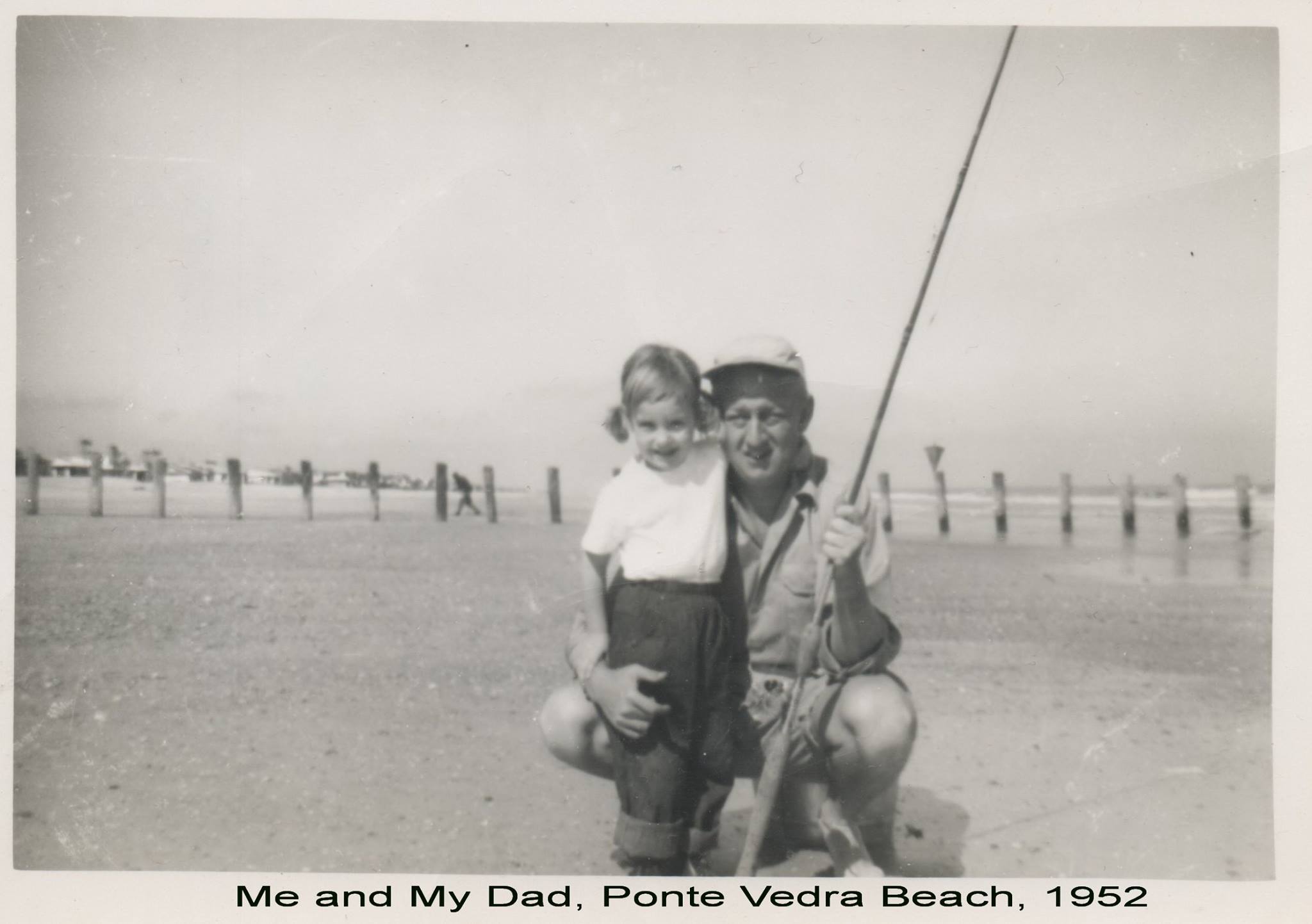
He may have gone to church because my Mother expected him to. He didn’t give hugs or say, ‘I love you.’ He never threw his arms around me, even as a child. I think that’s why I love the picture of me and my Dad fishing so much seeing his arm holding me tight. I remember happily sitting on his lap or sticking close by his side, and I remember him holding my hand when I was little. He always kissed me goodbye when dropping me off at school, or we took him to the airport when he headed out of town for work. I always kissed him before I went to bed. He always sent me cards on Valentine’s Day and would sign them, “Love, Daddy.” As an adult, I don’t recall any physical or verbal show of affection, even as he lay dying.
Sadly, I never approached him with words of affection or hugs either. He seemed so unapproachable in a way. He was quickly brought to tears when called upon to say grace before dinner or spoke of his parents. However, I know one thing: my Father loved me very much. Although never mentioned, I always understood that.
My Father died in a nursing home after suffering from a fall while alone in his house. He was hospitalized for dehydration and acquired resistance to vancomycin. His health issues were complicated, and he never returned home. Dad died on Jun 27th, 2001 and my brother and I buried him three days later, next to our Mother, at Greenlawn Cemetery in Jacksonville on his 83rd birthday.
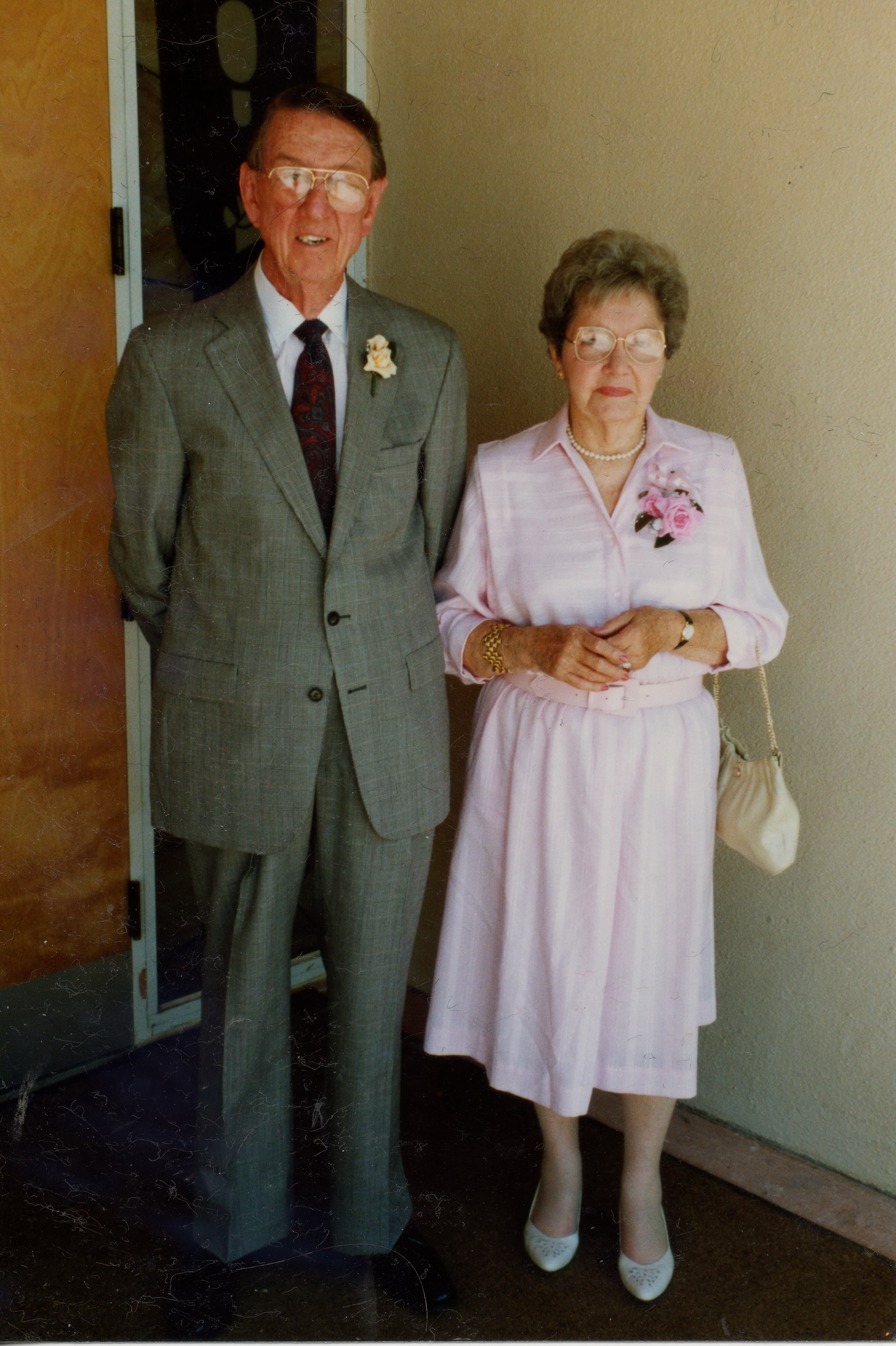
Mom and Dad - Miami 1990
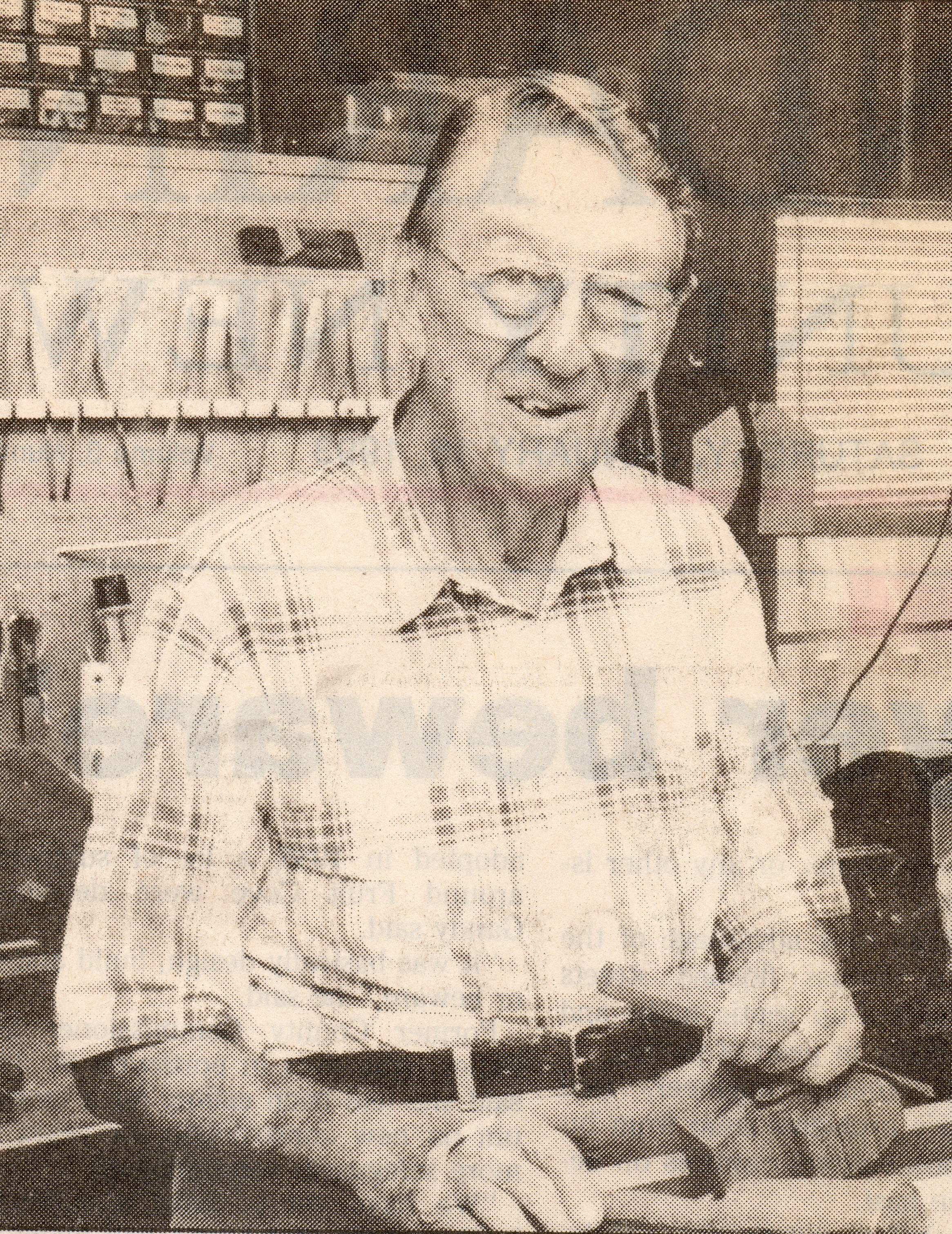
William Duane Fleming 1918-2001
.jpg)

No comments:
Post a Comment